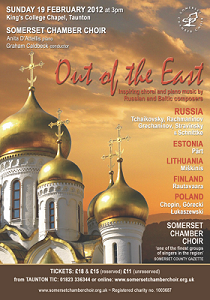



|
|
About |
Concerts |
|
|
|
|
|
www.somersetchamberchoir.org.uk © 2011 Somerset Chamber Choir Registered Charity No.1003687
Patrons: Dame Emma Kirkby and Sir David Willcocks




Sign up for concert updates
Enter your email address here to receive concert details
by email
|
Works: |
Tchaikovsky
Grechaninov Stravinksy
Kiev Chant Górecki Rachmaninov
Schnittke Arvo Pärt Rautavaara Łukaszewski Miškinis
Piano solos: Chopin
Łukaszewski Rachmaninov Rautavaara |
Blazheni Yazhe Izbral (How blessed are they) Khvalitye Gospoda s Nyebes (O Praise Him) Byl U Khrista Mladyentsa Sad (Legend - Izhe Kheruvimy (The Cherubic Hymn) Izhe Kheruvimy (The Cherubic Hymn) Otche nash (The Lord’s Prayer) Ave Maria Kontakion of the departed Amen Izhe Kheruvimy (The Cherubic Hymn) Blazhen Muzh (Blessed is the man) Bogoroditsye Dyevo (Ave Maria) Concerto for mixed chorus – 4th movement Bogoroditsye Dyevo (Ave Maria) Ehtoohymni (Evening Hymn from All- O Oriens (from O Antiphons) Angelis suis Deus
Waltz in C sharp minor, op 64 no. 2 Polonaise in Ab, op. 53 ‘Heroic’ Nocturne in C sharp minor (Posth.) Stadium Prelude in G sharp minor, op 32 no. 12 Sonata No. 2 (‘The Fire Sermon’) 1st movement |
|
Performers: |
Anita D’Attellis Graham Caldbeck |
Piano Conductor |
|
| ||
Review:
‘Concert of exotic and unfamiliar music, sung gloriously.’
Russian music is always popular with British audiences. The intense passion and emotion of Russian composers excites the ear unmistakably.
This Sunday afternoon (19th February) a local choir polished up their best Russian (and Finnish and Latin) to sing choral music 'Out of the East'. To add to the Eastern European flavour, pianist Anita D'Attellis played fiery music by Russian, Finnish and Polish composers.
The Choir sang throughout in the original languages. All carefully transliterated by Bass Ian Bromelow, in an extremely accessible and informative programme [notes by Graham Caldbeck], the songs were endlessly fascinating and painted a vivid picture of 'Eastern' culture.
First Tchaikovsky! From his 'Nine Sacred Pieces' (1885) we heard number seven, "Blessed
are those whom thou hast chosen" ("Блаженны те, кого Ты избрал"). Immediately the
different voices of the Somerset choir stood out distinctly. The final words, "И
Память их в род и род" ("Their rememberance is from generation to generation") rang
out in the chapel "род и род!" before the final 'Alleluia' pronounced in a very Russian
style, with a final drawn out ooh-
Throughout the concert, the quality never faltered. Musical Director, Graham Caldbeck,
kept everything very firmly under control, and the singers, in four ranks -
There was more Tchaikovsky ('The Liturgy of St John Chrysostom' and 'Crown of Roses')
ending with the 'Cherubic Hymn' from 'Chrysostom' -
Then Graham left the stage, and his rostrum was removed too, to make way for the
afternoon's soloist -
Anita started with a well known Polish composer, who worked in exile in Paris in the nineteenth century, Fredyryc Chopin. Everything Anita did was light, gentle and fluid. In the Waltz in C sharp minor the headlong rushes up the scale were soft as down, ending in the subtlest top note. Every accented note was precise, but gentle.
Rachmaninov's Prelude in G was full of rippling quavers like the story of Undine. There was a lot more power, but still that gentle touch. The forays into the top range of the instrument were magical.
Then to Finland for Einojuhani Rautavaara's Sonata No 2, "The Fire Sermon". From
predictable classical progression, Anita switched to crashing chaos. Still that magical
precision -
With Graham and his rostrum reinstated, the choir sang the Cherubic Hymn from another
'Liturgy of St John Chrysostom' -
Stravinsky's "Отец наш" (The Lord's Prayer -
Then, suddenly, we were in the Ukraine. From Kiev we heard the traditional "Kontakion"
(and "Ikos") For the Departed. This piece of Orthodox liturgy is familiar to us in
Devon -
And to finish the first half, a piece expounding one word -
After the interval, there was more emotive music to come:
For Rachmaninov's version of "Cherubic Hymn" from "St John Chrysostom", a sea of yellow music books appeared. The singers descend stepwise to the exaltation of the "life creating trinity", and then descend further to "Amen". The final Alleluias are soft and light, not drawn out at all. A low bass sustain continues beneath.
"Блажен муж" ("Blessed is the Man") from Rachmaninov's "1915 Vespers". Each line
is linked to the next by that haunting "Alliluia", but each time it is different.
Sometimes soft, sometimes strident, in a strange repeating pattern. There is one
more after the final "Amen", followed by "слава Тебе, Боже!" -
Alfred Schnittke's "Concerto for Mixed Chorus" prays that the singing may become
healing. Above the words a high soprano voice maintains a single note. There was
a soloist listed for this song -
Paweł Łukaszewski's "Stadium" (for solo piano) was fired at the audience in hectic bursts. The rhythm initially seemed harsh, but became increasingly pleasing. A softer more conventional passage gave way to wild gambolling around the scale. A bass rumble like Mussorgsky's 'Gnomus' finally gave way to one last triumphant chord.
Anita D'Attellis returned to the Yamaha grand piano for one more Chopin piece, "Polonaise
in A flat". This too was a gallop, but in a more classical style. The 'heroic' theme
was very familiar. Every phrase was polished, and played as Chopin intended -
Anita agreed to play an encore -
Graham Caldbeck then took us to Estonia and Arvo Pärt's "Ave Maria", now in Russian
-
Now we moved to even more unfamiliar territory. Einojuhani Rautavaara's Finnish "Ehtoohymni" ("Evening Hymn". Slightly more understandable to English speakers, this starts with a soprano chorus of "Jeesus Kristus", before the basses take things down step by step in Suomi to the deep, deep "Isää, Poikaa ja Pyhää Henkeä" ("Father, Son and Holy Ghost"). The basses really gave it everything.
Suddenly we were in the slightly more familiar territory of Latin again and the Advent
antiphon for 20th December -
Finally the most obscure piece of the concert -
After the applause of the audience died down, Graham explained that the last was
not so obscure after all. On Wednesday 15 February [repeated on Sunday, while this
concert was happening] the BBC's 'Choral Evensong', at St Alban's Church in Holborn,
had included Miškinis' 'Time is Endless'. Fired by the challenge Graham and the Somerset
Chamber Choir had to try his music too -
As an encore we had a now familiar theme one more time, "Богородице Дево, радуйся" ("Ave Maria"). This time it was taken from Rachmaninov's "1915 Vespers". In Graham's own words "It's the same [text as the Pärt], but it takes longer." This version was certainly slower, whispered and leisurely. The basses and sopranos have a chance to weave in and out of each other's sound before the last searing cry of "Яко Спаса родила еси душ наших" ("Thou hast borne the Saviour of our Souls").
Many thanks to all involved. A glorious concert of exotic and unfamiliar music, sung gloriously. Well done to Musical Director Graham Caldbeck, and to all the singers. Special thanks to Anita D'Attellis for coming from Henley on Thames to play the piano so beautifully. With a little persuasion, she might come to Devon some day . . .
Luch Càise-
Luch presents the ‘Classical Journey’ radio show on Exeter’s Phonic FM.
This review,
with pictures, can be found on the Classical Journey blog
Sunday 19 February 2012
King’s College Chapel, Taunton
‘Out of the East’
Anita D’Attellis performing Rautavaara’s Piano Sonata No.2 “The Fire Sermon” (1st mvt) live at this concert

